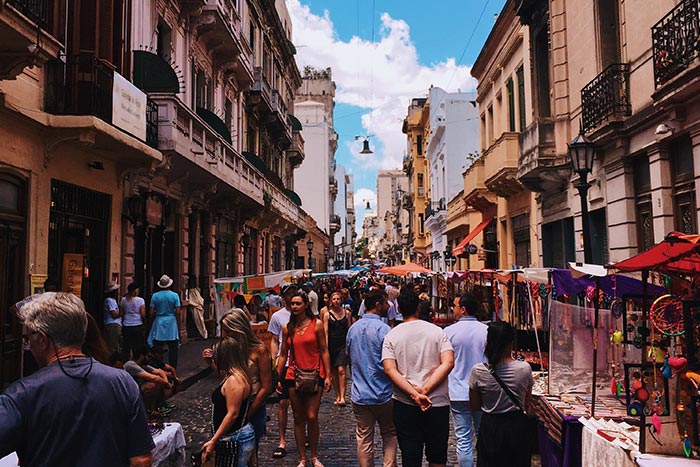I can’t define it precisely, but there’s something explicitly romantic about Buenos Aires.
You know how Vegas casinos supposedly pump oxygen into the gaming area to keep gamblers alert for longer? Well, I think the government of B.A. pumps some kind of voodoo love potion into the local atmosphere. You just can’t help but fall in love with this city. Maybe it’s the sheer tragedy of what has befallen Argentina over the decades. Passion is, after all, synonymous with agony, so it does make some sense.
Anyway, I’ve gone and lost the point, which is this: Buenos Aires is clearly desperate for a little love these days.
The city has recently launched what is becoming seemingly ubiquitous globally: a digital nomad visa program. As a digital nomad myself, and as someone who researches and writes about this work-abroad/live-abroad lifestyle regularly, I understand the allure: B.A. wants to attract rootless workers who have the freedom—and the dinero—to live anywhere in the world. Tourists come and go after a few days or a week or two. Digital nomads hang around for months, maybe longer.
There’s profit in that.
But for me and you…well, the visa is pointless, as I’ll come back to in a moment.
B.A.’s City Tourist Board reports that in 2019—our last normal year as a planet of travelers—roughly 8,000 Americans and Europeans lived in Buenos Aires for longer than 90 days. Officials in City Hall think that by offering this new, nomad-oriented visa, B.A. can lure as many as 22,000 long-stay nomads. Whatever math they’re using, City Hall calculates nearly $140 million in economic activity from all those nomads.
Don’t mind me while I pee in the punchbowl, but we (Americans and Europeans) don’t really need a digital nomad visa to live and work in Argentina, especially not in Buenos Aires.
See, Argentina’s tourist visa resets if you leave the country and then re-enter. Which is a really easy process when you live in B.A. because B.A. sits alongside the Río de la Plata. You just hop a ferry in the morning and zip across to Colonia, Uruguay (a three-hour crossing). There, you grab yourself a hearty lunch at Charco Bistro (sit on the terrace overlooking the river). Stroll the beautiful, cobblestone streets of old Colonia, dating back to the 1600s. Maybe plop down at an al fresco café for a glass of fabulous Uruguayan tannat, a local wine varietal, while a busker plays tango music. Then, hop the afternoon ferry back to B.A. You arrive, go through the immigration process, get a new stamp in your passport, and you’re good to go for another 90-day stay.
And if a river-crossing just isn’t in your plans, well you can visit an immigration office in B.A and pay to extend your current visa. The cost AR$600… about $6.70 at current exchange rates.
So, really, there’s zero need to go through some sort of digital nomad visa process.
This all reminds me of those digital nomad visas that began cropping up across the Caribbean last year in response to the pandemic. Aruba, Barbados, the Caymans, others…they’re all trying to goose their tourist dollars by appealing to workers who have the flexibility to live and work abroad.
Problem is, most of those programs are relatively expensive. Some impose high-income thresholds. Most of the visas expire after a year. And in many cases, you cannot turn the visa into a long-term residence permit if you decide that living overseas is a lifestyle you want to continue.
Sorry, but I don’t see the value, unless all anyone is seeking is a short-term live-abroad sabbatical.
If, however, the goal is to actually build a nomadic life—or even a semi-permanent/permanent life—overseas, then these kinds of digital nomad visas aren’t the path to go. Why spend the money and the time walking toward a dead-end?
The B.A. plan isn’t nearly as egregious. It’s just kind of pointless when the country’s tourist visa gives you everything you need.
That said, I would absolutely recommend Argentina to anyone with a love of Latin culture and the ability to live and work overseas. Argentines are passionate and boisterous and fun. They adopt everyone into their culture. B.A. is beautiful, one of the world’s truly picturesque cities. The food is spectacular, particularly the meats (so if you’re of a vegetarian bent, keep that in mind). The country itself is the eighth largest in the world in terms of land, and there is everything there from beautiful, red-rock canyons in the north; to upscale ski resorts high in the snow-capped Andes; to vast plains of pampas grass, cattle, and gauchos. Seriously—one of my favorite countries.
Before COVID-19 came calling, I was looking to rent an Airbnb for a few months in Bariloche, a Swiss-like village at the base of the Andes and resting on the shores of a picturesque, mountain lake more than 1,500 feet deep.
Basically, what I’m saying is “Go to Argentina!” Live there for a while as a digital nomad—or just as an expat. Experience the place from top to bottom.
You don’t need a digital nomad visa to live the Argentine life.

